Business Law Assignment: Consumer Law, Negligence and Remedies
VerifiedAdded on 2023/04/10
|12
|3234
|328
Homework Assignment
AI Summary
This business law assignment addresses two hypothetical scenarios. The first examines whether Angelwings Airlines breached the Australian Consumer Law (ACL) through misleading advertising and failure to provide promised services to Fabio and Greta, analyzing the application of ACL provisions, including misleading and deceptive conduct under section 18 and misrepresentations under section 29. The second scenario explores whether Denise can claim damages from Alex for financial losses resulting from a negligent misstatement, examining the principles of negligent misstatement under the Civil Liability Act 2003 (Qld), duty of care, breach of duty, and causation, referencing relevant case law such as *Hedley Byrne & Co v Heller & Partners Ltd* and *Mutual Life & Citizens Assurance Co Ltd v Evatt*.
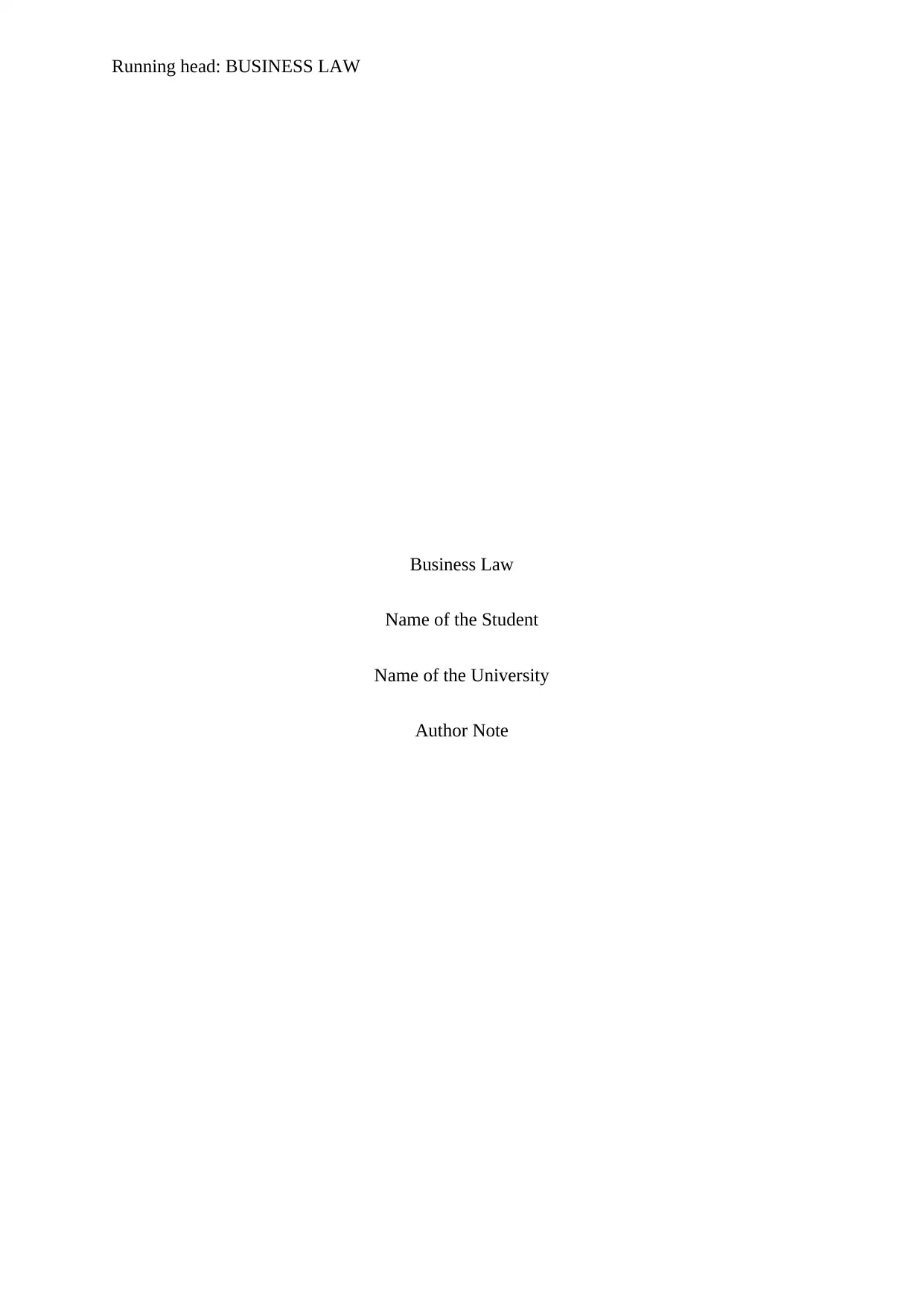
Running head: BUSINESS LAW
Business Law
Name of the Student
Name of the University
Author Note
Business Law
Name of the Student
Name of the University
Author Note
Paraphrase This Document
Need a fresh take? Get an instant paraphrase of this document with our AI Paraphraser
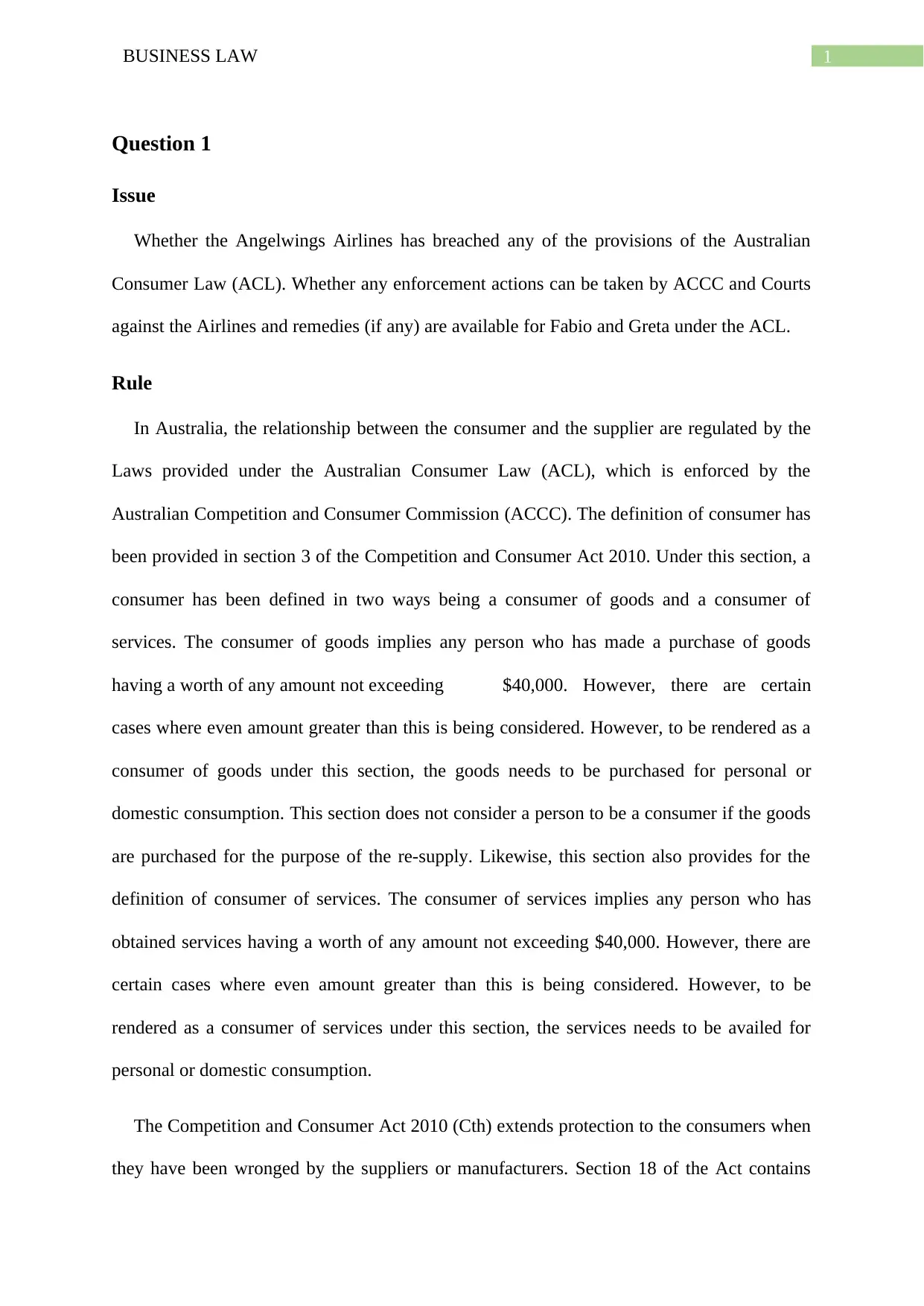
1BUSINESS LAW
Question 1
Issue
Whether the Angelwings Airlines has breached any of the provisions of the Australian
Consumer Law (ACL). Whether any enforcement actions can be taken by ACCC and Courts
against the Airlines and remedies (if any) are available for Fabio and Greta under the ACL.
Rule
In Australia, the relationship between the consumer and the supplier are regulated by the
Laws provided under the Australian Consumer Law (ACL), which is enforced by the
Australian Competition and Consumer Commission (ACCC). The definition of consumer has
been provided in section 3 of the Competition and Consumer Act 2010. Under this section, a
consumer has been defined in two ways being a consumer of goods and a consumer of
services. The consumer of goods implies any person who has made a purchase of goods
having a worth of any amount not exceeding $40,000. However, there are certain
cases where even amount greater than this is being considered. However, to be rendered as a
consumer of goods under this section, the goods needs to be purchased for personal or
domestic consumption. This section does not consider a person to be a consumer if the goods
are purchased for the purpose of the re-supply. Likewise, this section also provides for the
definition of consumer of services. The consumer of services implies any person who has
obtained services having a worth of any amount not exceeding $40,000. However, there are
certain cases where even amount greater than this is being considered. However, to be
rendered as a consumer of services under this section, the services needs to be availed for
personal or domestic consumption.
The Competition and Consumer Act 2010 (Cth) extends protection to the consumers when
they have been wronged by the suppliers or manufacturers. Section 18 of the Act contains
Question 1
Issue
Whether the Angelwings Airlines has breached any of the provisions of the Australian
Consumer Law (ACL). Whether any enforcement actions can be taken by ACCC and Courts
against the Airlines and remedies (if any) are available for Fabio and Greta under the ACL.
Rule
In Australia, the relationship between the consumer and the supplier are regulated by the
Laws provided under the Australian Consumer Law (ACL), which is enforced by the
Australian Competition and Consumer Commission (ACCC). The definition of consumer has
been provided in section 3 of the Competition and Consumer Act 2010. Under this section, a
consumer has been defined in two ways being a consumer of goods and a consumer of
services. The consumer of goods implies any person who has made a purchase of goods
having a worth of any amount not exceeding $40,000. However, there are certain
cases where even amount greater than this is being considered. However, to be rendered as a
consumer of goods under this section, the goods needs to be purchased for personal or
domestic consumption. This section does not consider a person to be a consumer if the goods
are purchased for the purpose of the re-supply. Likewise, this section also provides for the
definition of consumer of services. The consumer of services implies any person who has
obtained services having a worth of any amount not exceeding $40,000. However, there are
certain cases where even amount greater than this is being considered. However, to be
rendered as a consumer of services under this section, the services needs to be availed for
personal or domestic consumption.
The Competition and Consumer Act 2010 (Cth) extends protection to the consumers when
they have been wronged by the suppliers or manufacturers. Section 18 of the Act contains
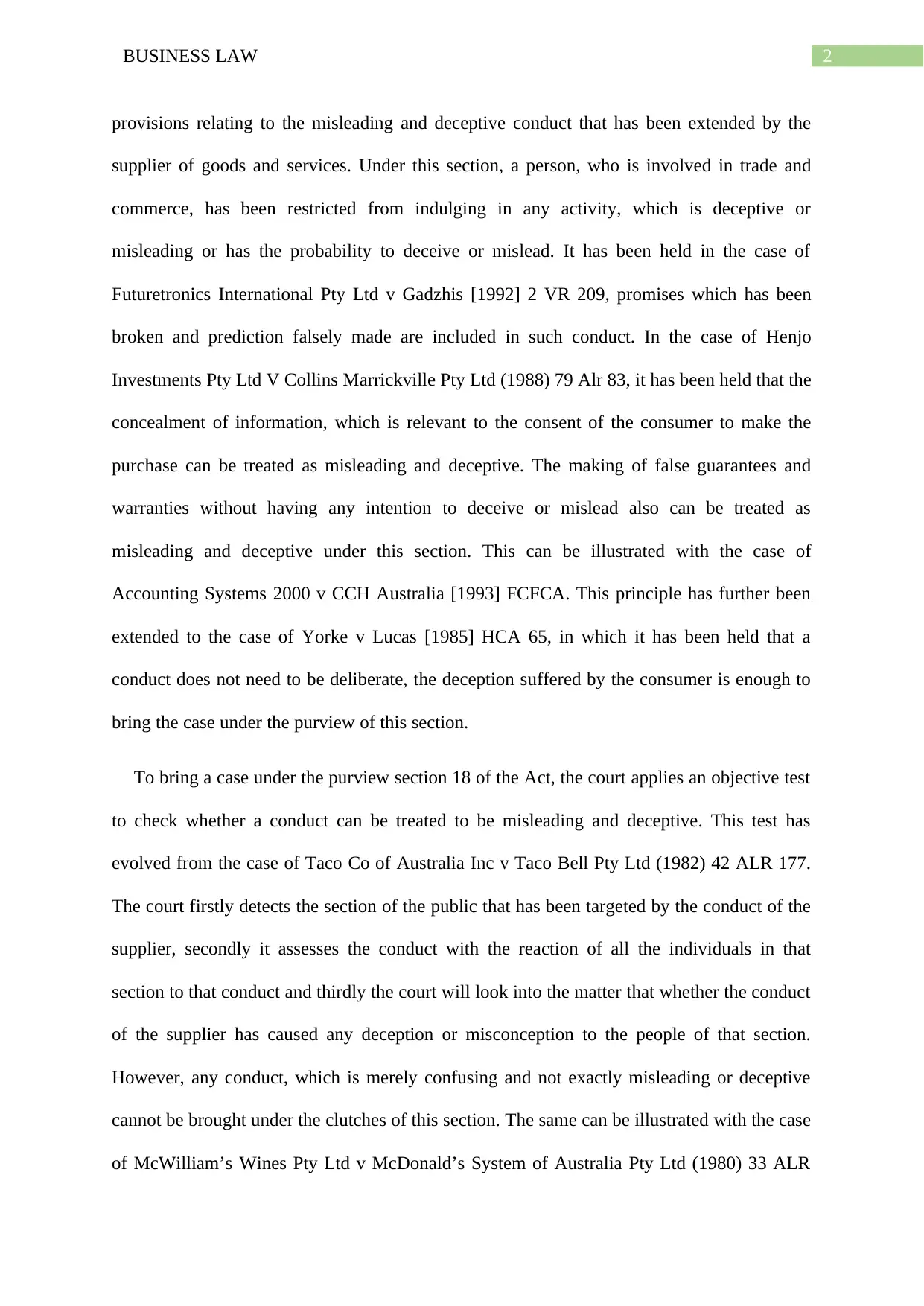
2BUSINESS LAW
provisions relating to the misleading and deceptive conduct that has been extended by the
supplier of goods and services. Under this section, a person, who is involved in trade and
commerce, has been restricted from indulging in any activity, which is deceptive or
misleading or has the probability to deceive or mislead. It has been held in the case of
Futuretronics International Pty Ltd v Gadzhis [1992] 2 VR 209, promises which has been
broken and prediction falsely made are included in such conduct. In the case of Henjo
Investments Pty Ltd V Collins Marrickville Pty Ltd (1988) 79 Alr 83, it has been held that the
concealment of information, which is relevant to the consent of the consumer to make the
purchase can be treated as misleading and deceptive. The making of false guarantees and
warranties without having any intention to deceive or mislead also can be treated as
misleading and deceptive under this section. This can be illustrated with the case of
Accounting Systems 2000 v CCH Australia [1993] FCFCA. This principle has further been
extended to the case of Yorke v Lucas [1985] HCA 65, in which it has been held that a
conduct does not need to be deliberate, the deception suffered by the consumer is enough to
bring the case under the purview of this section.
To bring a case under the purview section 18 of the Act, the court applies an objective test
to check whether a conduct can be treated to be misleading and deceptive. This test has
evolved from the case of Taco Co of Australia Inc v Taco Bell Pty Ltd (1982) 42 ALR 177.
The court firstly detects the section of the public that has been targeted by the conduct of the
supplier, secondly it assesses the conduct with the reaction of all the individuals in that
section to that conduct and thirdly the court will look into the matter that whether the conduct
of the supplier has caused any deception or misconception to the people of that section.
However, any conduct, which is merely confusing and not exactly misleading or deceptive
cannot be brought under the clutches of this section. The same can be illustrated with the case
of McWilliam’s Wines Pty Ltd v McDonald’s System of Australia Pty Ltd (1980) 33 ALR
provisions relating to the misleading and deceptive conduct that has been extended by the
supplier of goods and services. Under this section, a person, who is involved in trade and
commerce, has been restricted from indulging in any activity, which is deceptive or
misleading or has the probability to deceive or mislead. It has been held in the case of
Futuretronics International Pty Ltd v Gadzhis [1992] 2 VR 209, promises which has been
broken and prediction falsely made are included in such conduct. In the case of Henjo
Investments Pty Ltd V Collins Marrickville Pty Ltd (1988) 79 Alr 83, it has been held that the
concealment of information, which is relevant to the consent of the consumer to make the
purchase can be treated as misleading and deceptive. The making of false guarantees and
warranties without having any intention to deceive or mislead also can be treated as
misleading and deceptive under this section. This can be illustrated with the case of
Accounting Systems 2000 v CCH Australia [1993] FCFCA. This principle has further been
extended to the case of Yorke v Lucas [1985] HCA 65, in which it has been held that a
conduct does not need to be deliberate, the deception suffered by the consumer is enough to
bring the case under the purview of this section.
To bring a case under the purview section 18 of the Act, the court applies an objective test
to check whether a conduct can be treated to be misleading and deceptive. This test has
evolved from the case of Taco Co of Australia Inc v Taco Bell Pty Ltd (1982) 42 ALR 177.
The court firstly detects the section of the public that has been targeted by the conduct of the
supplier, secondly it assesses the conduct with the reaction of all the individuals in that
section to that conduct and thirdly the court will look into the matter that whether the conduct
of the supplier has caused any deception or misconception to the people of that section.
However, any conduct, which is merely confusing and not exactly misleading or deceptive
cannot be brought under the clutches of this section. The same can be illustrated with the case
of McWilliam’s Wines Pty Ltd v McDonald’s System of Australia Pty Ltd (1980) 33 ALR
⊘ This is a preview!⊘
Do you want full access?
Subscribe today to unlock all pages.

Trusted by 1+ million students worldwide
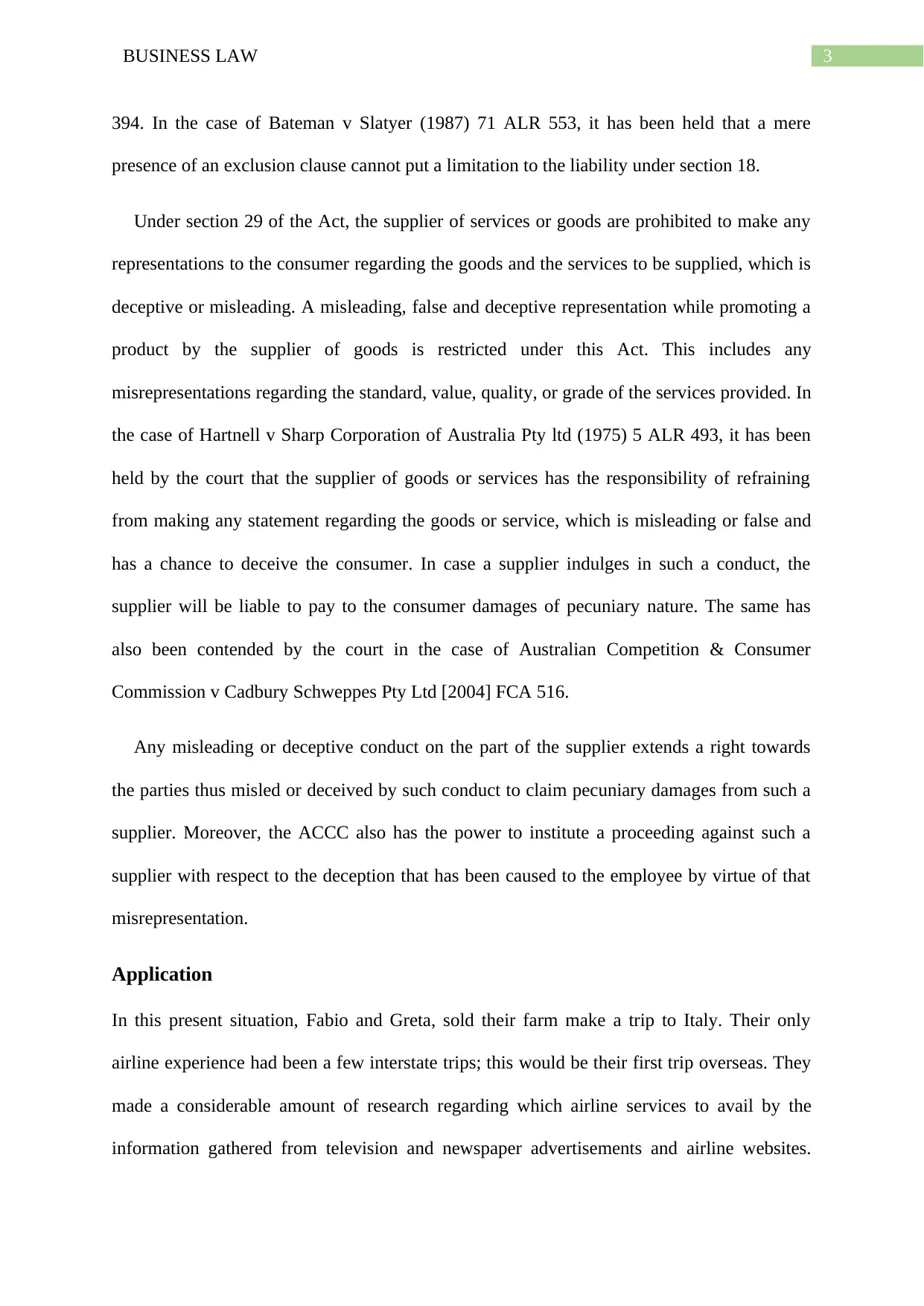
3BUSINESS LAW
394. In the case of Bateman v Slatyer (1987) 71 ALR 553, it has been held that a mere
presence of an exclusion clause cannot put a limitation to the liability under section 18.
Under section 29 of the Act, the supplier of services or goods are prohibited to make any
representations to the consumer regarding the goods and the services to be supplied, which is
deceptive or misleading. A misleading, false and deceptive representation while promoting a
product by the supplier of goods is restricted under this Act. This includes any
misrepresentations regarding the standard, value, quality, or grade of the services provided. In
the case of Hartnell v Sharp Corporation of Australia Pty ltd (1975) 5 ALR 493, it has been
held by the court that the supplier of goods or services has the responsibility of refraining
from making any statement regarding the goods or service, which is misleading or false and
has a chance to deceive the consumer. In case a supplier indulges in such a conduct, the
supplier will be liable to pay to the consumer damages of pecuniary nature. The same has
also been contended by the court in the case of Australian Competition & Consumer
Commission v Cadbury Schweppes Pty Ltd [2004] FCA 516.
Any misleading or deceptive conduct on the part of the supplier extends a right towards
the parties thus misled or deceived by such conduct to claim pecuniary damages from such a
supplier. Moreover, the ACCC also has the power to institute a proceeding against such a
supplier with respect to the deception that has been caused to the employee by virtue of that
misrepresentation.
Application
In this present situation, Fabio and Greta, sold their farm make a trip to Italy. Their only
airline experience had been a few interstate trips; this would be their first trip overseas. They
made a considerable amount of research regarding which airline services to avail by the
information gathered from television and newspaper advertisements and airline websites.
394. In the case of Bateman v Slatyer (1987) 71 ALR 553, it has been held that a mere
presence of an exclusion clause cannot put a limitation to the liability under section 18.
Under section 29 of the Act, the supplier of services or goods are prohibited to make any
representations to the consumer regarding the goods and the services to be supplied, which is
deceptive or misleading. A misleading, false and deceptive representation while promoting a
product by the supplier of goods is restricted under this Act. This includes any
misrepresentations regarding the standard, value, quality, or grade of the services provided. In
the case of Hartnell v Sharp Corporation of Australia Pty ltd (1975) 5 ALR 493, it has been
held by the court that the supplier of goods or services has the responsibility of refraining
from making any statement regarding the goods or service, which is misleading or false and
has a chance to deceive the consumer. In case a supplier indulges in such a conduct, the
supplier will be liable to pay to the consumer damages of pecuniary nature. The same has
also been contended by the court in the case of Australian Competition & Consumer
Commission v Cadbury Schweppes Pty Ltd [2004] FCA 516.
Any misleading or deceptive conduct on the part of the supplier extends a right towards
the parties thus misled or deceived by such conduct to claim pecuniary damages from such a
supplier. Moreover, the ACCC also has the power to institute a proceeding against such a
supplier with respect to the deception that has been caused to the employee by virtue of that
misrepresentation.
Application
In this present situation, Fabio and Greta, sold their farm make a trip to Italy. Their only
airline experience had been a few interstate trips; this would be their first trip overseas. They
made a considerable amount of research regarding which airline services to avail by the
information gathered from television and newspaper advertisements and airline websites.
Paraphrase This Document
Need a fresh take? Get an instant paraphrase of this document with our AI Paraphraser
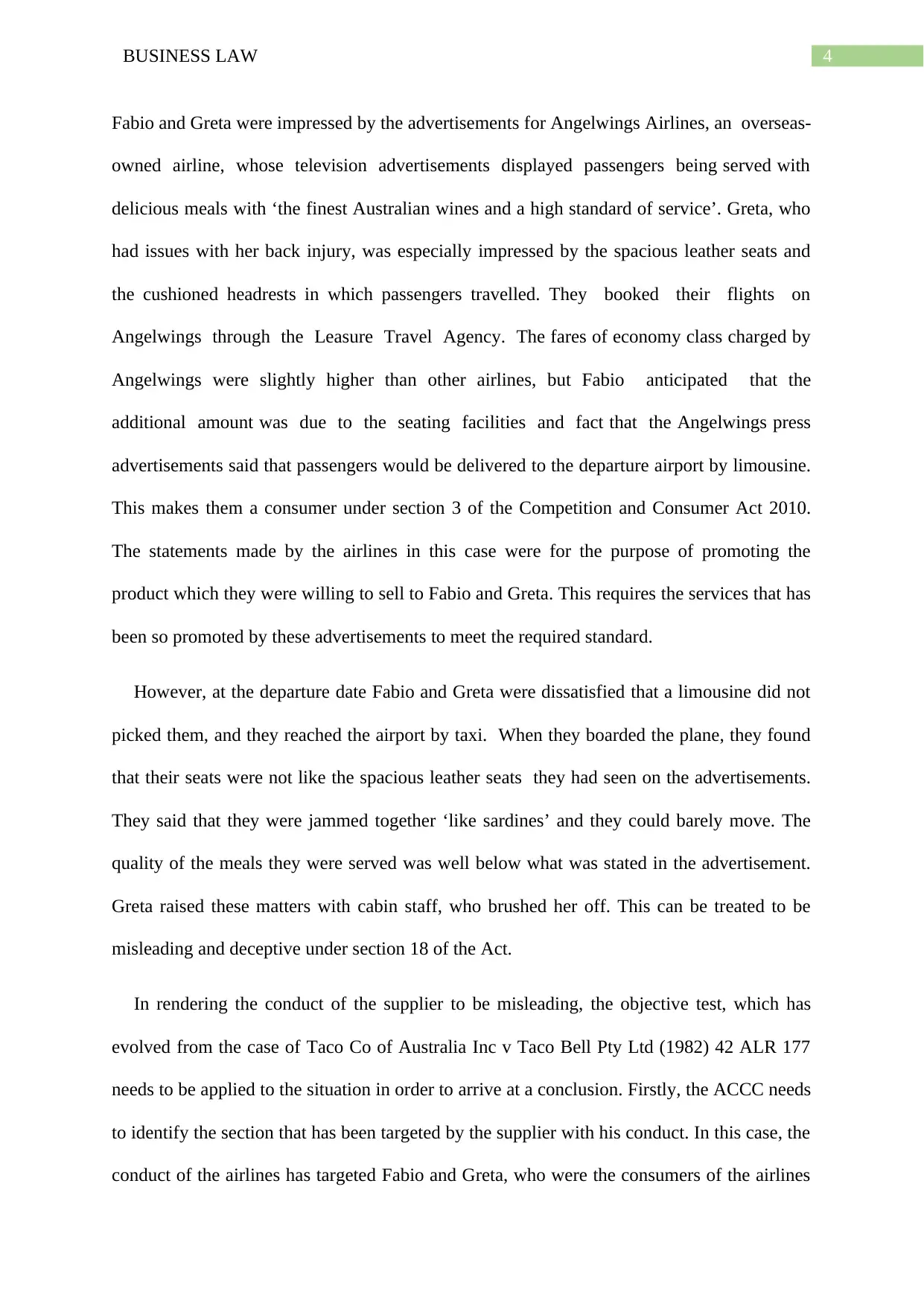
4BUSINESS LAW
Fabio and Greta were impressed by the advertisements for Angelwings Airlines, an overseas-
owned airline, whose television advertisements displayed passengers being served with
delicious meals with ‘the finest Australian wines and a high standard of service’. Greta, who
had issues with her back injury, was especially impressed by the spacious leather seats and
the cushioned headrests in which passengers travelled. They booked their flights on
Angelwings through the Leasure Travel Agency. The fares of economy class charged by
Angelwings were slightly higher than other airlines, but Fabio anticipated that the
additional amount was due to the seating facilities and fact that the Angelwings press
advertisements said that passengers would be delivered to the departure airport by limousine.
This makes them a consumer under section 3 of the Competition and Consumer Act 2010.
The statements made by the airlines in this case were for the purpose of promoting the
product which they were willing to sell to Fabio and Greta. This requires the services that has
been so promoted by these advertisements to meet the required standard.
However, at the departure date Fabio and Greta were dissatisfied that a limousine did not
picked them, and they reached the airport by taxi. When they boarded the plane, they found
that their seats were not like the spacious leather seats they had seen on the advertisements.
They said that they were jammed together ‘like sardines’ and they could barely move. The
quality of the meals they were served was well below what was stated in the advertisement.
Greta raised these matters with cabin staff, who brushed her off. This can be treated to be
misleading and deceptive under section 18 of the Act.
In rendering the conduct of the supplier to be misleading, the objective test, which has
evolved from the case of Taco Co of Australia Inc v Taco Bell Pty Ltd (1982) 42 ALR 177
needs to be applied to the situation in order to arrive at a conclusion. Firstly, the ACCC needs
to identify the section that has been targeted by the supplier with his conduct. In this case, the
conduct of the airlines has targeted Fabio and Greta, who were the consumers of the airlines
Fabio and Greta were impressed by the advertisements for Angelwings Airlines, an overseas-
owned airline, whose television advertisements displayed passengers being served with
delicious meals with ‘the finest Australian wines and a high standard of service’. Greta, who
had issues with her back injury, was especially impressed by the spacious leather seats and
the cushioned headrests in which passengers travelled. They booked their flights on
Angelwings through the Leasure Travel Agency. The fares of economy class charged by
Angelwings were slightly higher than other airlines, but Fabio anticipated that the
additional amount was due to the seating facilities and fact that the Angelwings press
advertisements said that passengers would be delivered to the departure airport by limousine.
This makes them a consumer under section 3 of the Competition and Consumer Act 2010.
The statements made by the airlines in this case were for the purpose of promoting the
product which they were willing to sell to Fabio and Greta. This requires the services that has
been so promoted by these advertisements to meet the required standard.
However, at the departure date Fabio and Greta were dissatisfied that a limousine did not
picked them, and they reached the airport by taxi. When they boarded the plane, they found
that their seats were not like the spacious leather seats they had seen on the advertisements.
They said that they were jammed together ‘like sardines’ and they could barely move. The
quality of the meals they were served was well below what was stated in the advertisement.
Greta raised these matters with cabin staff, who brushed her off. This can be treated to be
misleading and deceptive under section 18 of the Act.
In rendering the conduct of the supplier to be misleading, the objective test, which has
evolved from the case of Taco Co of Australia Inc v Taco Bell Pty Ltd (1982) 42 ALR 177
needs to be applied to the situation in order to arrive at a conclusion. Firstly, the ACCC needs
to identify the section that has been targeted by the supplier with his conduct. In this case, the
conduct of the airlines has targeted Fabio and Greta, who were the consumers of the airlines
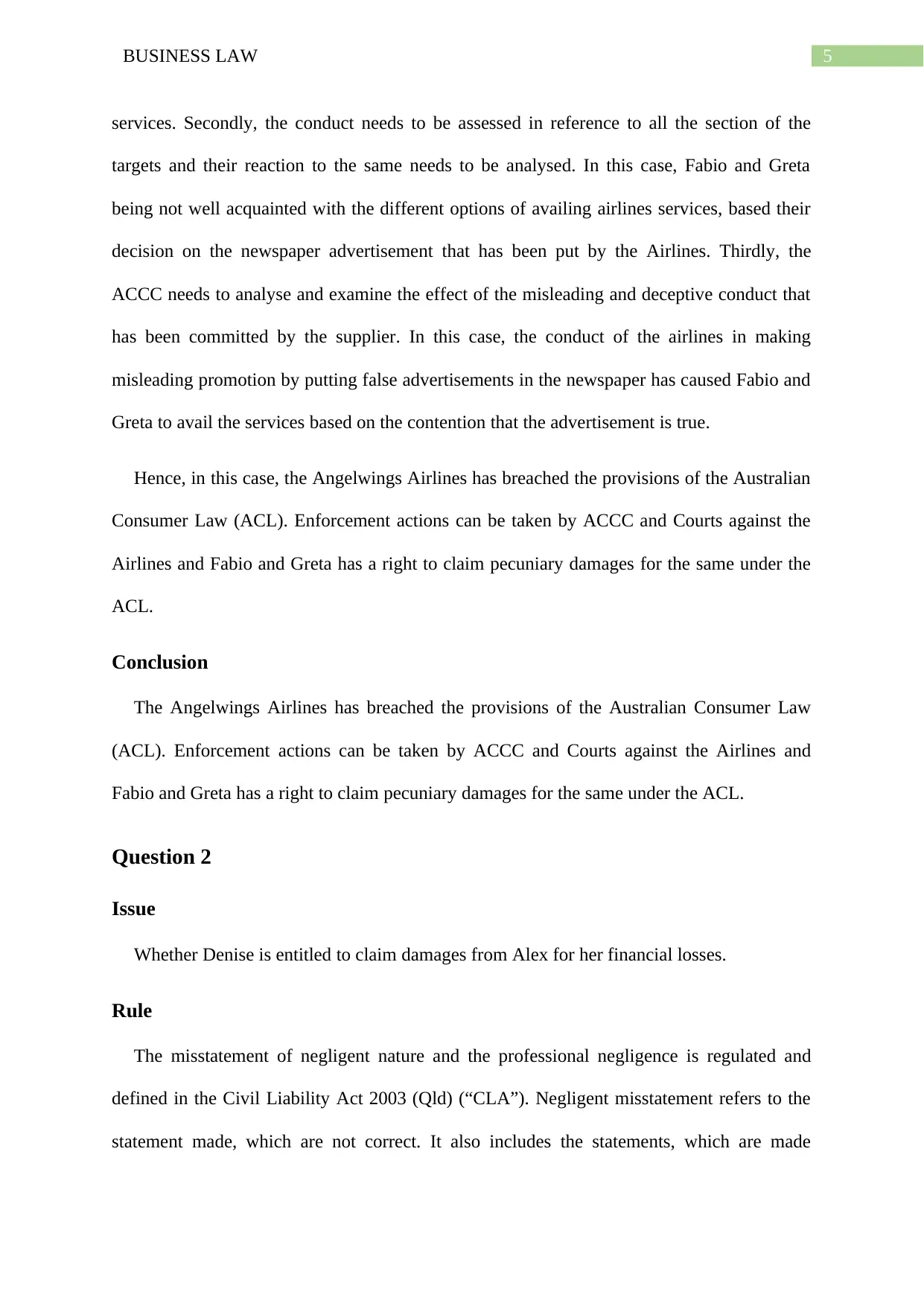
5BUSINESS LAW
services. Secondly, the conduct needs to be assessed in reference to all the section of the
targets and their reaction to the same needs to be analysed. In this case, Fabio and Greta
being not well acquainted with the different options of availing airlines services, based their
decision on the newspaper advertisement that has been put by the Airlines. Thirdly, the
ACCC needs to analyse and examine the effect of the misleading and deceptive conduct that
has been committed by the supplier. In this case, the conduct of the airlines in making
misleading promotion by putting false advertisements in the newspaper has caused Fabio and
Greta to avail the services based on the contention that the advertisement is true.
Hence, in this case, the Angelwings Airlines has breached the provisions of the Australian
Consumer Law (ACL). Enforcement actions can be taken by ACCC and Courts against the
Airlines and Fabio and Greta has a right to claim pecuniary damages for the same under the
ACL.
Conclusion
The Angelwings Airlines has breached the provisions of the Australian Consumer Law
(ACL). Enforcement actions can be taken by ACCC and Courts against the Airlines and
Fabio and Greta has a right to claim pecuniary damages for the same under the ACL.
Question 2
Issue
Whether Denise is entitled to claim damages from Alex for her financial losses.
Rule
The misstatement of negligent nature and the professional negligence is regulated and
defined in the Civil Liability Act 2003 (Qld) (“CLA”). Negligent misstatement refers to the
statement made, which are not correct. It also includes the statements, which are made
services. Secondly, the conduct needs to be assessed in reference to all the section of the
targets and their reaction to the same needs to be analysed. In this case, Fabio and Greta
being not well acquainted with the different options of availing airlines services, based their
decision on the newspaper advertisement that has been put by the Airlines. Thirdly, the
ACCC needs to analyse and examine the effect of the misleading and deceptive conduct that
has been committed by the supplier. In this case, the conduct of the airlines in making
misleading promotion by putting false advertisements in the newspaper has caused Fabio and
Greta to avail the services based on the contention that the advertisement is true.
Hence, in this case, the Angelwings Airlines has breached the provisions of the Australian
Consumer Law (ACL). Enforcement actions can be taken by ACCC and Courts against the
Airlines and Fabio and Greta has a right to claim pecuniary damages for the same under the
ACL.
Conclusion
The Angelwings Airlines has breached the provisions of the Australian Consumer Law
(ACL). Enforcement actions can be taken by ACCC and Courts against the Airlines and
Fabio and Greta has a right to claim pecuniary damages for the same under the ACL.
Question 2
Issue
Whether Denise is entitled to claim damages from Alex for her financial losses.
Rule
The misstatement of negligent nature and the professional negligence is regulated and
defined in the Civil Liability Act 2003 (Qld) (“CLA”). Negligent misstatement refers to the
statement made, which are not correct. It also includes the statements, which are made
⊘ This is a preview!⊘
Do you want full access?
Subscribe today to unlock all pages.

Trusted by 1+ million students worldwide
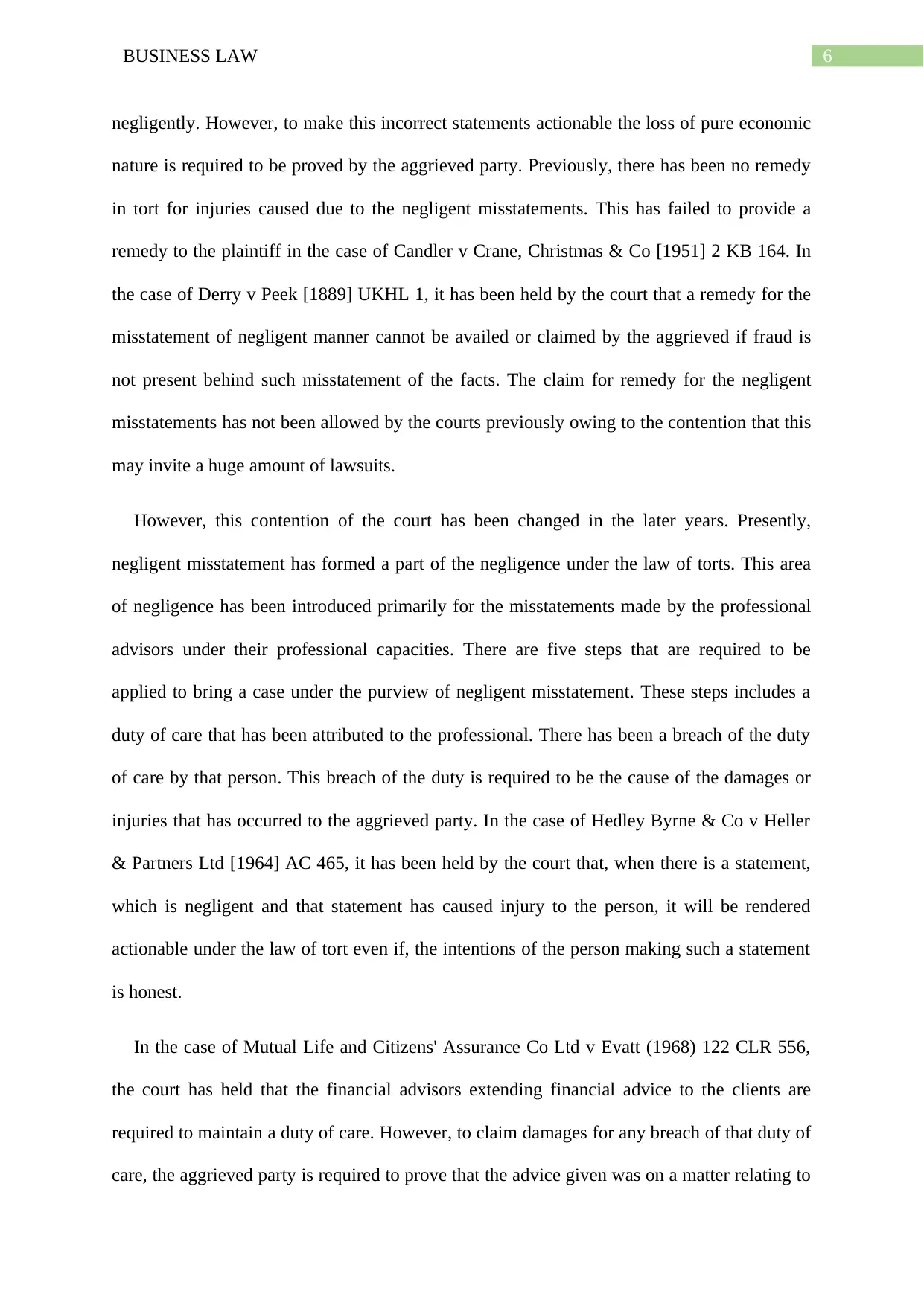
6BUSINESS LAW
negligently. However, to make this incorrect statements actionable the loss of pure economic
nature is required to be proved by the aggrieved party. Previously, there has been no remedy
in tort for injuries caused due to the negligent misstatements. This has failed to provide a
remedy to the plaintiff in the case of Candler v Crane, Christmas & Co [1951] 2 KB 164. In
the case of Derry v Peek [1889] UKHL 1, it has been held by the court that a remedy for the
misstatement of negligent manner cannot be availed or claimed by the aggrieved if fraud is
not present behind such misstatement of the facts. The claim for remedy for the negligent
misstatements has not been allowed by the courts previously owing to the contention that this
may invite a huge amount of lawsuits.
However, this contention of the court has been changed in the later years. Presently,
negligent misstatement has formed a part of the negligence under the law of torts. This area
of negligence has been introduced primarily for the misstatements made by the professional
advisors under their professional capacities. There are five steps that are required to be
applied to bring a case under the purview of negligent misstatement. These steps includes a
duty of care that has been attributed to the professional. There has been a breach of the duty
of care by that person. This breach of the duty is required to be the cause of the damages or
injuries that has occurred to the aggrieved party. In the case of Hedley Byrne & Co v Heller
& Partners Ltd [1964] AC 465, it has been held by the court that, when there is a statement,
which is negligent and that statement has caused injury to the person, it will be rendered
actionable under the law of tort even if, the intentions of the person making such a statement
is honest.
In the case of Mutual Life and Citizens' Assurance Co Ltd v Evatt (1968) 122 CLR 556,
the court has held that the financial advisors extending financial advice to the clients are
required to maintain a duty of care. However, to claim damages for any breach of that duty of
care, the aggrieved party is required to prove that the advice given was on a matter relating to
negligently. However, to make this incorrect statements actionable the loss of pure economic
nature is required to be proved by the aggrieved party. Previously, there has been no remedy
in tort for injuries caused due to the negligent misstatements. This has failed to provide a
remedy to the plaintiff in the case of Candler v Crane, Christmas & Co [1951] 2 KB 164. In
the case of Derry v Peek [1889] UKHL 1, it has been held by the court that a remedy for the
misstatement of negligent manner cannot be availed or claimed by the aggrieved if fraud is
not present behind such misstatement of the facts. The claim for remedy for the negligent
misstatements has not been allowed by the courts previously owing to the contention that this
may invite a huge amount of lawsuits.
However, this contention of the court has been changed in the later years. Presently,
negligent misstatement has formed a part of the negligence under the law of torts. This area
of negligence has been introduced primarily for the misstatements made by the professional
advisors under their professional capacities. There are five steps that are required to be
applied to bring a case under the purview of negligent misstatement. These steps includes a
duty of care that has been attributed to the professional. There has been a breach of the duty
of care by that person. This breach of the duty is required to be the cause of the damages or
injuries that has occurred to the aggrieved party. In the case of Hedley Byrne & Co v Heller
& Partners Ltd [1964] AC 465, it has been held by the court that, when there is a statement,
which is negligent and that statement has caused injury to the person, it will be rendered
actionable under the law of tort even if, the intentions of the person making such a statement
is honest.
In the case of Mutual Life and Citizens' Assurance Co Ltd v Evatt (1968) 122 CLR 556,
the court has held that the financial advisors extending financial advice to the clients are
required to maintain a duty of care. However, to claim damages for any breach of that duty of
care, the aggrieved party is required to prove that the advice given was on a matter relating to
Paraphrase This Document
Need a fresh take? Get an instant paraphrase of this document with our AI Paraphraser
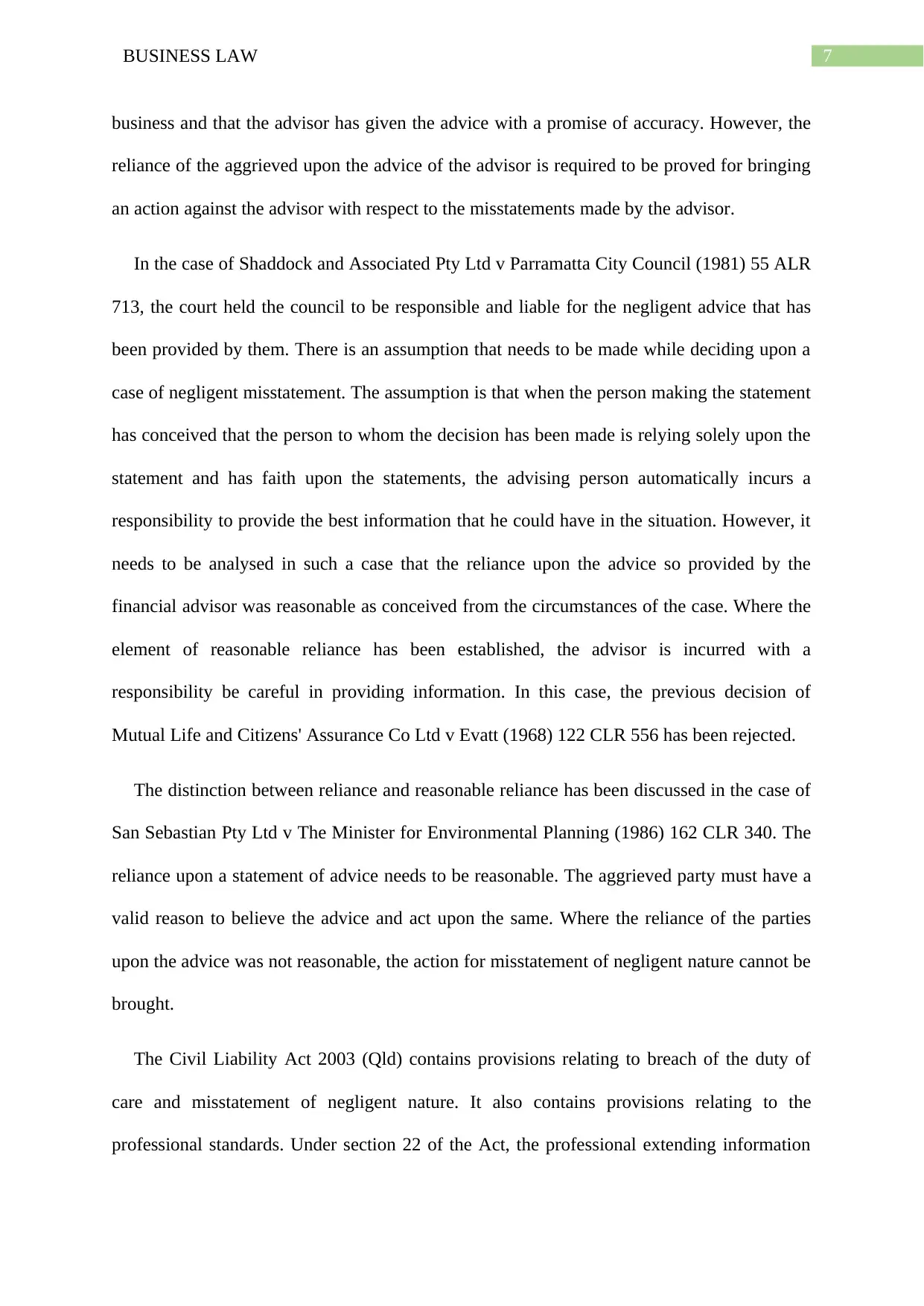
7BUSINESS LAW
business and that the advisor has given the advice with a promise of accuracy. However, the
reliance of the aggrieved upon the advice of the advisor is required to be proved for bringing
an action against the advisor with respect to the misstatements made by the advisor.
In the case of Shaddock and Associated Pty Ltd v Parramatta City Council (1981) 55 ALR
713, the court held the council to be responsible and liable for the negligent advice that has
been provided by them. There is an assumption that needs to be made while deciding upon a
case of negligent misstatement. The assumption is that when the person making the statement
has conceived that the person to whom the decision has been made is relying solely upon the
statement and has faith upon the statements, the advising person automatically incurs a
responsibility to provide the best information that he could have in the situation. However, it
needs to be analysed in such a case that the reliance upon the advice so provided by the
financial advisor was reasonable as conceived from the circumstances of the case. Where the
element of reasonable reliance has been established, the advisor is incurred with a
responsibility be careful in providing information. In this case, the previous decision of
Mutual Life and Citizens' Assurance Co Ltd v Evatt (1968) 122 CLR 556 has been rejected.
The distinction between reliance and reasonable reliance has been discussed in the case of
San Sebastian Pty Ltd v The Minister for Environmental Planning (1986) 162 CLR 340. The
reliance upon a statement of advice needs to be reasonable. The aggrieved party must have a
valid reason to believe the advice and act upon the same. Where the reliance of the parties
upon the advice was not reasonable, the action for misstatement of negligent nature cannot be
brought.
The Civil Liability Act 2003 (Qld) contains provisions relating to breach of the duty of
care and misstatement of negligent nature. It also contains provisions relating to the
professional standards. Under section 22 of the Act, the professional extending information
business and that the advisor has given the advice with a promise of accuracy. However, the
reliance of the aggrieved upon the advice of the advisor is required to be proved for bringing
an action against the advisor with respect to the misstatements made by the advisor.
In the case of Shaddock and Associated Pty Ltd v Parramatta City Council (1981) 55 ALR
713, the court held the council to be responsible and liable for the negligent advice that has
been provided by them. There is an assumption that needs to be made while deciding upon a
case of negligent misstatement. The assumption is that when the person making the statement
has conceived that the person to whom the decision has been made is relying solely upon the
statement and has faith upon the statements, the advising person automatically incurs a
responsibility to provide the best information that he could have in the situation. However, it
needs to be analysed in such a case that the reliance upon the advice so provided by the
financial advisor was reasonable as conceived from the circumstances of the case. Where the
element of reasonable reliance has been established, the advisor is incurred with a
responsibility be careful in providing information. In this case, the previous decision of
Mutual Life and Citizens' Assurance Co Ltd v Evatt (1968) 122 CLR 556 has been rejected.
The distinction between reliance and reasonable reliance has been discussed in the case of
San Sebastian Pty Ltd v The Minister for Environmental Planning (1986) 162 CLR 340. The
reliance upon a statement of advice needs to be reasonable. The aggrieved party must have a
valid reason to believe the advice and act upon the same. Where the reliance of the parties
upon the advice was not reasonable, the action for misstatement of negligent nature cannot be
brought.
The Civil Liability Act 2003 (Qld) contains provisions relating to breach of the duty of
care and misstatement of negligent nature. It also contains provisions relating to the
professional standards. Under section 22 of the Act, the professional extending information
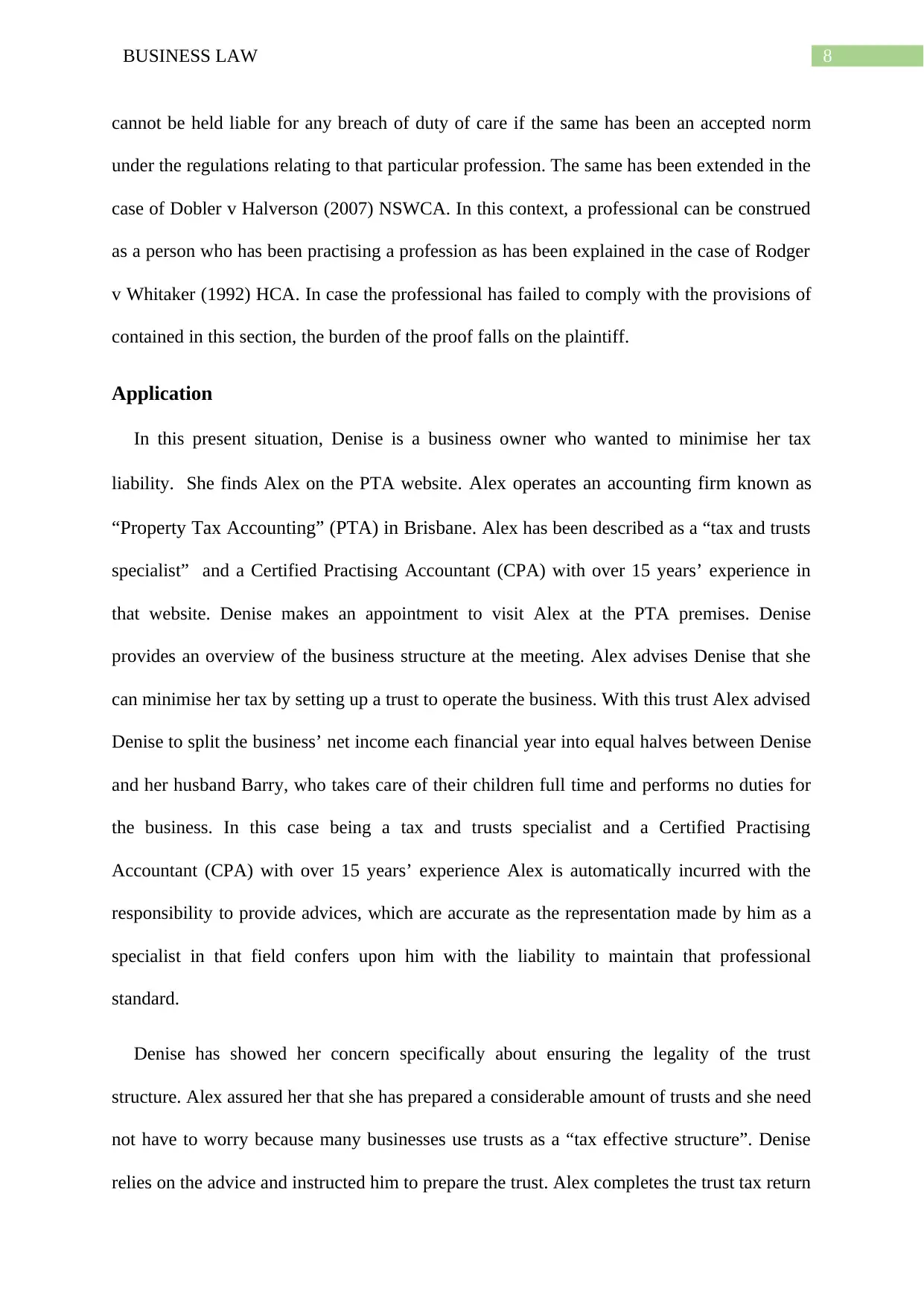
8BUSINESS LAW
cannot be held liable for any breach of duty of care if the same has been an accepted norm
under the regulations relating to that particular profession. The same has been extended in the
case of Dobler v Halverson (2007) NSWCA. In this context, a professional can be construed
as a person who has been practising a profession as has been explained in the case of Rodger
v Whitaker (1992) HCA. In case the professional has failed to comply with the provisions of
contained in this section, the burden of the proof falls on the plaintiff.
Application
In this present situation, Denise is a business owner who wanted to minimise her tax
liability. She finds Alex on the PTA website. Alex operates an accounting firm known as
“Property Tax Accounting” (PTA) in Brisbane. Alex has been described as a “tax and trusts
specialist” and a Certified Practising Accountant (CPA) with over 15 years’ experience in
that website. Denise makes an appointment to visit Alex at the PTA premises. Denise
provides an overview of the business structure at the meeting. Alex advises Denise that she
can minimise her tax by setting up a trust to operate the business. With this trust Alex advised
Denise to split the business’ net income each financial year into equal halves between Denise
and her husband Barry, who takes care of their children full time and performs no duties for
the business. In this case being a tax and trusts specialist and a Certified Practising
Accountant (CPA) with over 15 years’ experience Alex is automatically incurred with the
responsibility to provide advices, which are accurate as the representation made by him as a
specialist in that field confers upon him with the liability to maintain that professional
standard.
Denise has showed her concern specifically about ensuring the legality of the trust
structure. Alex assured her that she has prepared a considerable amount of trusts and she need
not have to worry because many businesses use trusts as a “tax effective structure”. Denise
relies on the advice and instructed him to prepare the trust. Alex completes the trust tax return
cannot be held liable for any breach of duty of care if the same has been an accepted norm
under the regulations relating to that particular profession. The same has been extended in the
case of Dobler v Halverson (2007) NSWCA. In this context, a professional can be construed
as a person who has been practising a profession as has been explained in the case of Rodger
v Whitaker (1992) HCA. In case the professional has failed to comply with the provisions of
contained in this section, the burden of the proof falls on the plaintiff.
Application
In this present situation, Denise is a business owner who wanted to minimise her tax
liability. She finds Alex on the PTA website. Alex operates an accounting firm known as
“Property Tax Accounting” (PTA) in Brisbane. Alex has been described as a “tax and trusts
specialist” and a Certified Practising Accountant (CPA) with over 15 years’ experience in
that website. Denise makes an appointment to visit Alex at the PTA premises. Denise
provides an overview of the business structure at the meeting. Alex advises Denise that she
can minimise her tax by setting up a trust to operate the business. With this trust Alex advised
Denise to split the business’ net income each financial year into equal halves between Denise
and her husband Barry, who takes care of their children full time and performs no duties for
the business. In this case being a tax and trusts specialist and a Certified Practising
Accountant (CPA) with over 15 years’ experience Alex is automatically incurred with the
responsibility to provide advices, which are accurate as the representation made by him as a
specialist in that field confers upon him with the liability to maintain that professional
standard.
Denise has showed her concern specifically about ensuring the legality of the trust
structure. Alex assured her that she has prepared a considerable amount of trusts and she need
not have to worry because many businesses use trusts as a “tax effective structure”. Denise
relies on the advice and instructed him to prepare the trust. Alex completes the trust tax return
⊘ This is a preview!⊘
Do you want full access?
Subscribe today to unlock all pages.

Trusted by 1+ million students worldwide
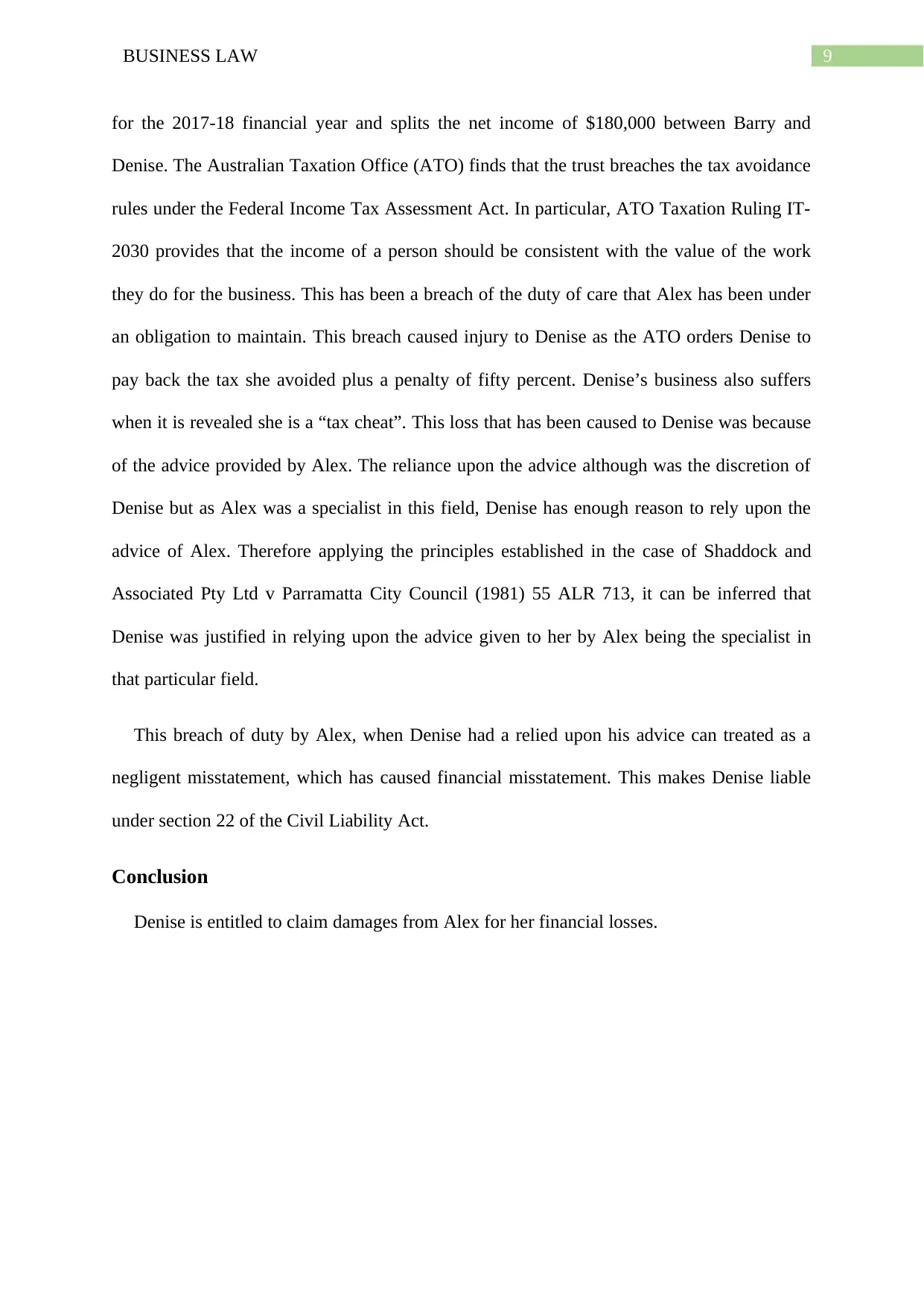
9BUSINESS LAW
for the 2017-18 financial year and splits the net income of $180,000 between Barry and
Denise. The Australian Taxation Office (ATO) finds that the trust breaches the tax avoidance
rules under the Federal Income Tax Assessment Act. In particular, ATO Taxation Ruling IT-
2030 provides that the income of a person should be consistent with the value of the work
they do for the business. This has been a breach of the duty of care that Alex has been under
an obligation to maintain. This breach caused injury to Denise as the ATO orders Denise to
pay back the tax she avoided plus a penalty of fifty percent. Denise’s business also suffers
when it is revealed she is a “tax cheat”. This loss that has been caused to Denise was because
of the advice provided by Alex. The reliance upon the advice although was the discretion of
Denise but as Alex was a specialist in this field, Denise has enough reason to rely upon the
advice of Alex. Therefore applying the principles established in the case of Shaddock and
Associated Pty Ltd v Parramatta City Council (1981) 55 ALR 713, it can be inferred that
Denise was justified in relying upon the advice given to her by Alex being the specialist in
that particular field.
This breach of duty by Alex, when Denise had a relied upon his advice can treated as a
negligent misstatement, which has caused financial misstatement. This makes Denise liable
under section 22 of the Civil Liability Act.
Conclusion
Denise is entitled to claim damages from Alex for her financial losses.
for the 2017-18 financial year and splits the net income of $180,000 between Barry and
Denise. The Australian Taxation Office (ATO) finds that the trust breaches the tax avoidance
rules under the Federal Income Tax Assessment Act. In particular, ATO Taxation Ruling IT-
2030 provides that the income of a person should be consistent with the value of the work
they do for the business. This has been a breach of the duty of care that Alex has been under
an obligation to maintain. This breach caused injury to Denise as the ATO orders Denise to
pay back the tax she avoided plus a penalty of fifty percent. Denise’s business also suffers
when it is revealed she is a “tax cheat”. This loss that has been caused to Denise was because
of the advice provided by Alex. The reliance upon the advice although was the discretion of
Denise but as Alex was a specialist in this field, Denise has enough reason to rely upon the
advice of Alex. Therefore applying the principles established in the case of Shaddock and
Associated Pty Ltd v Parramatta City Council (1981) 55 ALR 713, it can be inferred that
Denise was justified in relying upon the advice given to her by Alex being the specialist in
that particular field.
This breach of duty by Alex, when Denise had a relied upon his advice can treated as a
negligent misstatement, which has caused financial misstatement. This makes Denise liable
under section 22 of the Civil Liability Act.
Conclusion
Denise is entitled to claim damages from Alex for her financial losses.
Paraphrase This Document
Need a fresh take? Get an instant paraphrase of this document with our AI Paraphraser
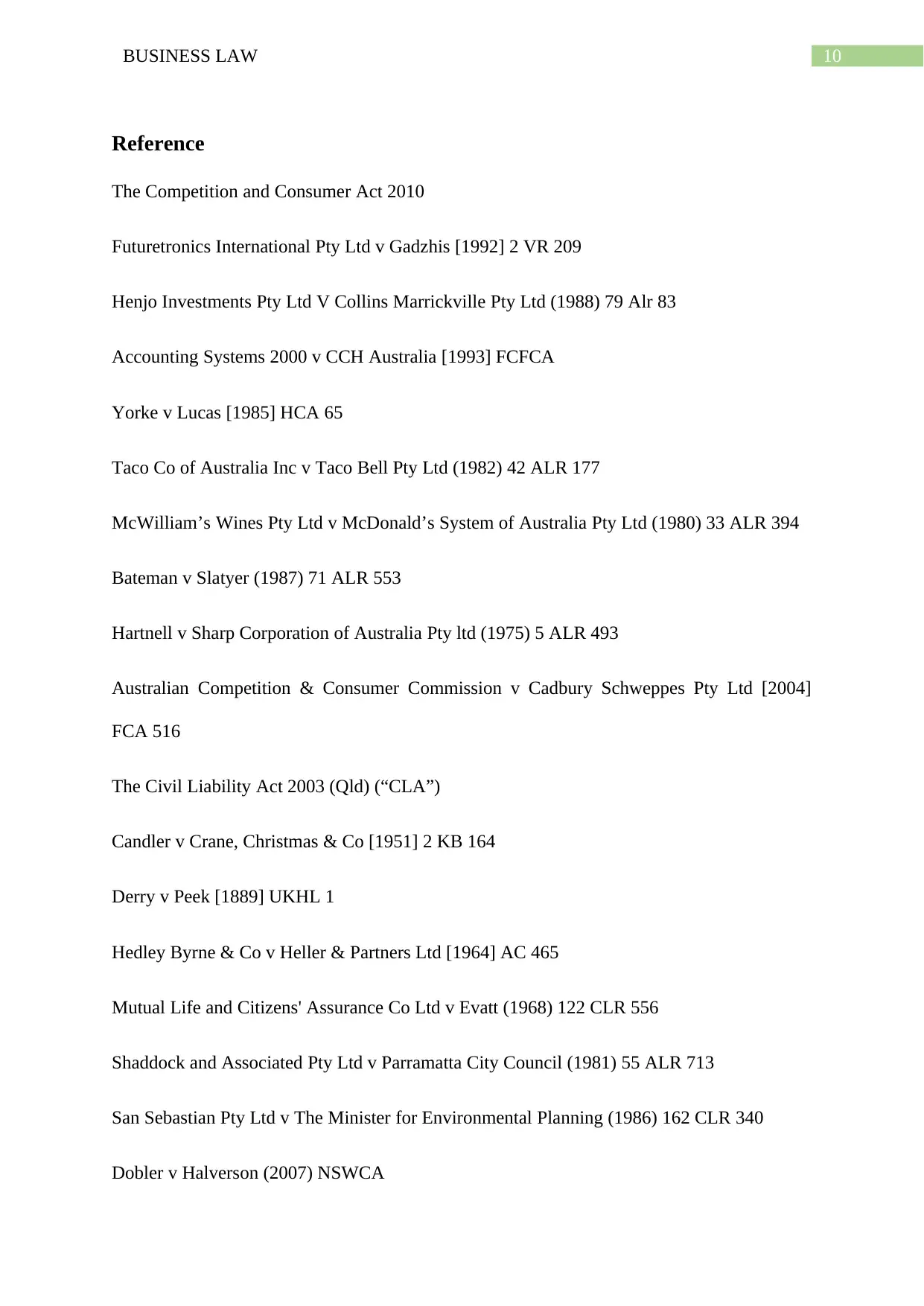
10BUSINESS LAW
Reference
The Competition and Consumer Act 2010
Futuretronics International Pty Ltd v Gadzhis [1992] 2 VR 209
Henjo Investments Pty Ltd V Collins Marrickville Pty Ltd (1988) 79 Alr 83
Accounting Systems 2000 v CCH Australia [1993] FCFCA
Yorke v Lucas [1985] HCA 65
Taco Co of Australia Inc v Taco Bell Pty Ltd (1982) 42 ALR 177
McWilliam’s Wines Pty Ltd v McDonald’s System of Australia Pty Ltd (1980) 33 ALR 394
Bateman v Slatyer (1987) 71 ALR 553
Hartnell v Sharp Corporation of Australia Pty ltd (1975) 5 ALR 493
Australian Competition & Consumer Commission v Cadbury Schweppes Pty Ltd [2004]
FCA 516
The Civil Liability Act 2003 (Qld) (“CLA”)
Candler v Crane, Christmas & Co [1951] 2 KB 164
Derry v Peek [1889] UKHL 1
Hedley Byrne & Co v Heller & Partners Ltd [1964] AC 465
Mutual Life and Citizens' Assurance Co Ltd v Evatt (1968) 122 CLR 556
Shaddock and Associated Pty Ltd v Parramatta City Council (1981) 55 ALR 713
San Sebastian Pty Ltd v The Minister for Environmental Planning (1986) 162 CLR 340
Dobler v Halverson (2007) NSWCA
Reference
The Competition and Consumer Act 2010
Futuretronics International Pty Ltd v Gadzhis [1992] 2 VR 209
Henjo Investments Pty Ltd V Collins Marrickville Pty Ltd (1988) 79 Alr 83
Accounting Systems 2000 v CCH Australia [1993] FCFCA
Yorke v Lucas [1985] HCA 65
Taco Co of Australia Inc v Taco Bell Pty Ltd (1982) 42 ALR 177
McWilliam’s Wines Pty Ltd v McDonald’s System of Australia Pty Ltd (1980) 33 ALR 394
Bateman v Slatyer (1987) 71 ALR 553
Hartnell v Sharp Corporation of Australia Pty ltd (1975) 5 ALR 493
Australian Competition & Consumer Commission v Cadbury Schweppes Pty Ltd [2004]
FCA 516
The Civil Liability Act 2003 (Qld) (“CLA”)
Candler v Crane, Christmas & Co [1951] 2 KB 164
Derry v Peek [1889] UKHL 1
Hedley Byrne & Co v Heller & Partners Ltd [1964] AC 465
Mutual Life and Citizens' Assurance Co Ltd v Evatt (1968) 122 CLR 556
Shaddock and Associated Pty Ltd v Parramatta City Council (1981) 55 ALR 713
San Sebastian Pty Ltd v The Minister for Environmental Planning (1986) 162 CLR 340
Dobler v Halverson (2007) NSWCA
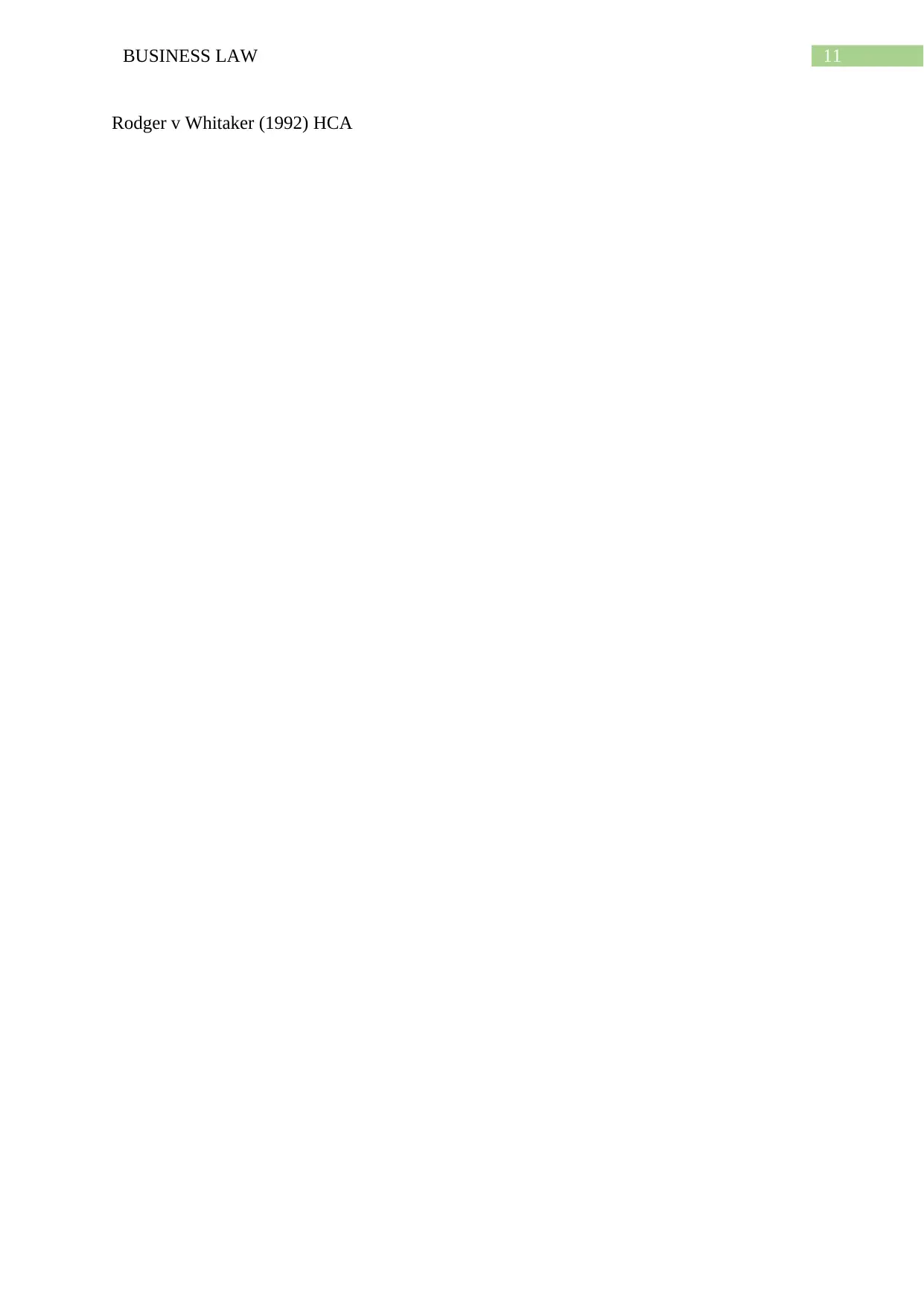
11BUSINESS LAW
Rodger v Whitaker (1992) HCA
Rodger v Whitaker (1992) HCA
⊘ This is a preview!⊘
Do you want full access?
Subscribe today to unlock all pages.

Trusted by 1+ million students worldwide
1 out of 12
Related Documents
Your All-in-One AI-Powered Toolkit for Academic Success.
+13062052269
info@desklib.com
Available 24*7 on WhatsApp / Email
![[object Object]](/_next/static/media/star-bottom.7253800d.svg)
Unlock your academic potential
Copyright © 2020–2026 A2Z Services. All Rights Reserved. Developed and managed by ZUCOL.





